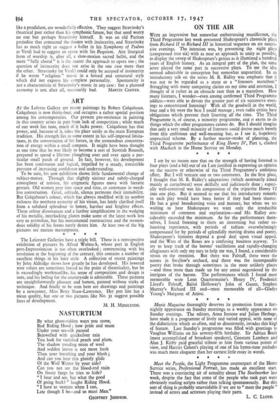ON THE AIR WITH an impressive but somewhat embarrassing munificence,
the Third Programme last week presented Shakespeare's chronicle plays from Richard II to Richard III in historical sequence on six succes- sive evenings. The intention was, by presenting the eight plays (compressed into six) with as near an approach to unity as possible, to display the sweep of Shakespeare's genius as it illumined a hundred years of English history. As an integral pt of the plan, the same actor played the same part in successive plays. To me the idea seemed admirable in conception but somewhat Impractical. In an introductory talk on the series M. R. Ridley was emphatic that it was not to be regarded as a stunt or a "listeners marathon." Struggling with many competing claims on my time and attention, I thought of it rather as an obstacle race than as a marathon. How many listeners, I wonder—even among confirmed Third Programme addicts—were able to devote the greater part of six successive even- ings to concentrated listening? With all the goodwill in the world, four and a bit were the best I could•manage ; even radio critics have obligations which prevent their listening all the time. The Third Programme is, of course, a minority programme, and it exists to do things which the other programmes cannot do. But I should imagine that only a very small minority of listeners could derive much benefit from this ambitious and well-meaning but, as I see it, hopelessly unpractical scheme. By a further master-stroke of planning, the Third Programme performance of King Henry IV, Part i, clashed with Macbeth in the Home Service on Monday.
* * * * I am by no means sure that on the strength of having listened to four plays (and a bit) out of six I am justified in expressing an opinion on the success or otherwise of the Third Programme's ambitious effort. But I will venture one or two comments. In the first place, I thought that M. R. Ridley's adaptations (which necessarily aimed mainly at curtailment) were skilfully and judiciously done ; especi- ally well-contrived was his compression of the tripartite Henry VI into one play. But it seemed to me that his introductory remarks to each play would have been better if they had been shorter. He has a good broadcasting voice and manner, but when we are waiting -to hear Shakespeare we want only the irreducible minimum of comment and explanation—and Mr. Ridley con- siderably exceeded the minimum. As for the performances them- selves, I found listening to them an interesting but rather ex- hausting experience, with periods of tedium overwhelmingly compensated for by periods of splendidly moving drama and poetry. Shakespeare's histories depend a good deal upon visual appeal, and the Wars of the Roses are a confusing business anyway. To try to keep track of the barons' vacillations and rapidly-changing allegiances with only my ears to help me was, I found, a considerable strain on the attention. But there was Falstaff, there were the scenes in Swallow's orchard, and there was the incomparable poetry that broke through sometimes in the most unlikely places —and these more than made up for any ennui engendered by the intrigues of the barons. The performances which I found most memorable were Leon Quartermaine's Henry IV, Frederick Lloyd's Falstaff, Baliol Holloway's John of Gaunt, Stephen Murray's Richard III and—most memorable of all—Gladys Young's Margaret of Anjou.
* * * Music Magazine thoroughly deserves its promotion from a fort- nightly appearance on Sunday mornings to a weekly appearance on Sunday evenings. The editors, Anna Instone and Julian Herbage, have made it a programme of lively and varied appeal, with none of the didacticism which so often, and so disastrously, invades this kinfi of feature. Last Sunday's programme was filled with greetings to Vaughan Williams on his seventy-fifth birthday. Sir Adrian Boult (most accomplished of broadcast speakers), Constant Lambert and Alan J. Kirby paid graceful tribute to him from various points of view, and Harriet Cohen's playing of one of his hymn-tune preludes was much more eloquent than her earnest little essay in words.
* * * Meet the People, the Light Programme counterpart of the Home Service series, Professional Portrait, has made an excellent start. There was a convincing air of actuality about The Steelworker last week, despite the fact that some of the people who took part were obviously reading scripts rather than talking spontaneously. But this sort of thing is probably unavoidable if we are to " meet the people" instead of actors and actresses playing their parts.
L. C. LLOYD.


































 Previous page
Previous page